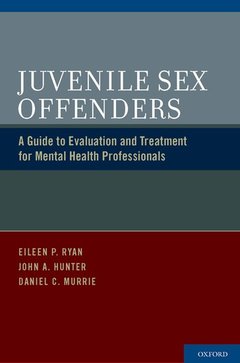Description
Juvenile Sex Offenders
A Guide to Evaluation and Treatment for Mental Health Professionals
Authors: Ryan Eileen P., Murrie Daniel C., Hunter John A.
Language: English
Subject for Juvenile Sex Offenders:
Approximative price 102.81 €
In Print (Delivery period: 21 days).
Add to cart
Publication date: 04-2012
272 p. · 16.2x23.6 cm · Hardback
272 p. · 16.2x23.6 cm · Hardback
Description
/li>Contents
/li>Biography
/li>
A significant percentage of sexual abuse in the United States is committed by juveniles, and mental health professionals increasingly receive requests to evaluate these juveniles. With an emphasis on practicality and utility, Juvenile Sex Offenders fills a gap in the current literature by providing a thoughtful, thorough approach to evaluating and treating youth who have committed sexual offenses or have engaged in sexually abusive behavior. Serving as a functional guide, this text expertly prepares clinicians for the challenging task of evaluating juveniles, picking up where traditional clinical training often falls short and providing state-of-the-art assessment techniques as well as an overview of treatment modalities. Chapters highlight the many ways in which juveniles charged with sexual offenses differ from adults, the common dilemmas facing evaluators, and the changing perceptions and legal trends with respect to youth crime. Chapters also cover sexual development and behaviors among children and adolescents, risk factors and risk assessment, case examples for working with attorneys, and interventions and pharmacological approaches. Clinical practitioners with limited forensic training will benefit from the guidance on formal forensic evaluation and the review of literature on assessment approaches specific to youth, while forensic experts will gain developmental perspective in evaluating and treating young sexual offenders. Set in a hopeful and optimistic framework, Juvenile Sex Offenders is a practical, empirically based guide on the best practices in evaluating and treating this poorly understood and underserved population.
Chapter 1 Changing Perceptions of Juvenile Sexual Offending in Society and the Legal System. Eileen P. Ryan. Chapter 2 Placing Sexual Behavior Problems in Context: What is alt,"Normalagt," Sexual Behavior among Juveniles?. Daniel C. Murrie. Chapter 3 Patterns of Sexual Offending in Juveniles and Risk Factors. John A. Hunter. Chapter 4 Psychopathology in Juvenile Offenders and Sexually Offending Juveniles. Eileen P. Ryan. Chapter 5 Forensic Evaluation versus Clinical Evaluation: How Do They Differ?. Eileen P. Ryan. Chapter 6 Interviewing, Evaluation, and Risk Assessment of Sexually Offending Youth. Eileen P. Ryan. Chapter 7 Assessment Instruments for Juveniles Who Sexually Offend. Daniel C. Murrie. Chapter 8 Management and Treatment Methods. John A. Hunter. Chapter 9 Biological and Pharmacologic Treatment of Sexually Aberrant Behavior. Eileen P. Ryan.
Eileen P. Ryan, D.O. is a board certified general, child and adolescent, and forensic psychiatrist. She is an attending psychiatrist at the Commonwealth Center for Children and Adolescents in Staunton, Virginia and Associate Professor of Psychiatry and Neurobehavioral Sciences at the University of Virginia where she is Assistant Director of the Forensic Psychiatry Fellowship at the University of Virginia and Medical Director of the Institute of Law, Psychiatry & Public Policy where she performs forensic evaluations. She also evaluates and treats adolescents at a juvenile detention center. John A. Hunter, Ph.D. has over 50 publications on juvenile sexual offending and/or sexual trauma. He is the Military Sexual Trauma Program Coordinator for the Southeast Louisiana Veterans Health Care System in New Orleans, and Clinical Associate Professor in the Department of Psychiatry and Behavioral Sciences at Tulane University School of Medicine. Daniel C. Murrie, Ph.D. is Director of Psychology at the University of Virginia's Institute of Law, Psychiatry, and Public Policy, and an Associate Professor of Psychiatry and Neurobehavioral Sciences at the University of Virginia School of Medicine. He performs forensic evaluations, trains clinicians in forensic mental health assessment, and has authored over 40 publications on forensic evaluation, risk assessment, juvenile justice, and related issues.
© 2024 LAVOISIER S.A.S.

